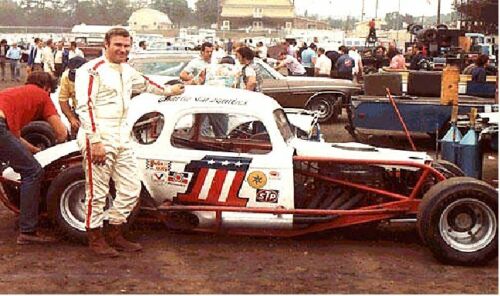
Charlie Jarzombek: Early Car
On the anniversary of my father’s passing, I decided to repost this story from 2014 to my Civmix blog. It is interesting to read in retrospect. In all facets of life and work, I believe that you learn more from failure than from success. At Albany Public Library, two wonderful initiatives emerged from the initial failure of a tablet lending program: hot spot lending and the expansion of our WiFi on library property and further into the community. These two programs have only grown in popularity during the pandemic. So my original thesis, learned from my father, is even more correct now than it was when I first wrote this blog.
If you are interested in more information on my father’s racing career, this is a quick little primer: 50 Greatest Modified Drivers – Charlie Jarzombek 1942-1987 & Best of the Rest: Chargin’ Charlie was always out in front, Suffolk Times
————————————————-
In 2014 my father was posthumously inducted into the New York State Stock Car Hall of Fame in Saratoga. I typically don’t attend such events. However, my aunt could not make the trip and did not want my uncle to go alone. Since it was in Saratoga, I drew the shortest straw. My uncle is not a fan of public speaking, but he is a big fan of making me sweat. So, as we walked into the Saratoga Automobile Museum he looked at me, gave me his patented smirk (he has 6 actual patents, this one is fictional), and said, ” You’re going to give his induction speech.”
Now part of my job is to do public speaking, so I embraced the challenge. I had about 30 minutes to cram in everything I could learn about my father’s career in racing. A subject I know little about. So I made the rounds, and within a few brief conversations, and a quicker google search, I decided on my thesis. I never saw my father win a race, at least not that I can recall. I can’t even remember seeing him finish one. I saw a lot of blown engines and a few crashes. I hear stories about how great he was, and I have a giant plaque in my dining room from when he was champion of the Long Island Racing circuit.
I can’t remember being at any race where my dad raised that checkered flag. What I do remember was a family of farmers who never shied away from failure. Who were obsessed with making a “better” car. Who were just as excited with a “new build” as coming home with a trophy. When something went wrong they accepted it, and went forward with new changes. My family never believed in “if it isn’t broke, don’t fix it.” That was the theme of the induction speech I gave about my father. But it is also what he passed down to me — never be afraid of failure.
My dad had his racecar. I have libraries. I was asked by a colleague a few months back to find someone from APL to present about our WiFi hotspot loaning program. I volunteered myself. My interest wasn’t so much in sharing the success of our current program, but in examining the failure of the tablet loaning program that preceded it. I believe that you may learn more from failure than from success. Even before we launched it, I had a suspicion that the program, one where we lent out Android tablets with WiFi to the public, might hit some snags. But the program cost us very little to provide. The tablets cost us nothing; it was part of the service fee. This was not a new idea; other libraries did it. As word got out about the program, staff understandably expressed apprehension. This, I thought at the time, was a challenge to my leadership. I doubled down. I would not hear the negativity. I went from silently hedging my bets on its success to thinking, “THIS IS GOING TO BE GREAT!” Then Jordan Carleo-Evangelist wrote an article in the TU. A very positive article. Positive press for the library! I made the mistake of reading the comments. They were not necessarily positive. I wrote it off as Albanyitis, a term everyone uses on the local music scene.
A week later I stood at the circulation desk of one of our branches, listening to a clerk do his best sales pitch for the tablet program. The patron said, “This is great, but it isn’t going to last,” She then explained why, expressing the same thoughts as everyone else. I actually wondered, “Was this set up?” I suffer from a dour expression. Those who know me say I always look concerned. I also have a policy to never talk about work at home. But I needed to talk to someone, someone I thought would understand. So when my wife unexpectedly asked, “What’s wrong,” I jumped at the chance to explain the push back I was getting about the new program. Her reaction, laughter. “You realize that isn’t going to work,” and then she accurately predicted everything that would, and did, go wrong. For a second I wondered if they had gotten to her as well. Within the first month of loaning tablets to the public, everything went sideways. People burned through data like there was no tomorrow. The waiting list was too long. Tablets disappeared and were broken. I fielded emails and angry phone calls. I spent a Sunday on the phone with a patron who was mad about the sudden throttling of bandwidth . I failed. Notice I said “I.”
The program didn’t work. But it did reignite our interest in loaning out hotspots and gave birth to the Device Loaning Committee, which is always coming up with cool ideas. APL tried something new. The smart people who work here figured it out. We moved on, and we are the better for it. I had failed. Not because the program failed. I failed because I became afraid of failure. It became personal. Things had been going really well, and maybe I had gotten too comfortable. If there is a philosophy I follow, it is Stoicism. My reaction was not stoic in any way. Instead of the obstacle being the way, I sat right down on it and had a pitty party. The failure of the tablet loaning will not be my biggest disappointment as a library director.The impact on the library was minimal, but it had a major effect on me personally. The impact on my ego was HUGE. For a few months after we pulled the plug on the program, I became uncharacteristically fearful of trying new things. It wasn’t until recently that I have felt myself.
As I thought about the tablet program’s failure, I came to a pretty interesting observation about myself. Libraries are not racecars. When the engine blows, there is no finishing the race. Libraries are nuanced and complicated. They can, and will limp along. I think when I look back this is going to be a seminal moment in my career, and in some ways my life. It was a big leadership lesson. It was also a milestone personally. I am more like my father than I thought, and I need to be a little bit more like him in the future. Accept failure when it comes and learn from it. The alternative is stasis.


Was diving a bit deeper into CivMix this weekend and saw your blog, and stumbled across the column about your address on your dad. I loved it. It’s true: People who don’t fail rarely succeed. And the fun, when you can relax into it, is the trying.
In my library days, I remember fielding all kinds of cockamamie ideas (some of them mine), which I know you do as well. When we were smart about it, we’d decide to just float the idea at one branch and see how it went (I’m thinking of the art display at the Pine Hills branch). Sometimes it would grow, sometimes it would be dropped, and sometimes we’d just leave it alone in the one branch. Trial and error, which is really a form of try and assess, seems like a safer way to build anything in this judgmental world. And in the world of politics (which we’re both in, for better and worse), you gotta be careful as well as bold! Hope all is well. I have the week off, sitting on a lake in Valatie I never even heard of until a few weeks ago. Lucky me! Best, Dennis